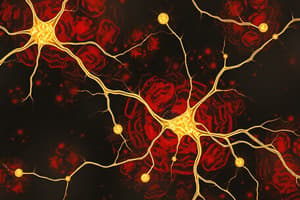Podcast
Questions and Answers
What is the primary function of voltage-gated Na+ channels in cells?
What is the primary function of voltage-gated Na+ channels in cells?
- To help propagate action potentials. (correct)
- To facilitate myelination.
- To increase membrane resistance.
- To generate passive currents.
What is myelination and its role in signal conduction?
What is myelination and its role in signal conduction?
- The wrapping of axons with Schwann cells and Oligodendrocytes to enhance conduction. (correct)
- The formation of new neurons in the CNS.
- The creation of synapses between neurons.
- The process of increasing signal loss.
What is the effect of increasing the length constant ($\lambda$) on action potential propagation?
What is the effect of increasing the length constant ($\lambda$) on action potential propagation?
- It decreases the conduction velocity.
- It results in shorter distances for action potential propagation.
- It increases the likelihood of signal loss.
- It allows action potentials to travel further before diminishing. (correct)
How does myelination influence the membrane's electrical properties?
How does myelination influence the membrane's electrical properties?
Which cells are responsible for myelination in the peripheral nervous system (PNS)?
Which cells are responsible for myelination in the peripheral nervous system (PNS)?
What happens in biological tissue when a voltage is applied across the membrane?
What happens in biological tissue when a voltage is applied across the membrane?
What is a key characteristic of cells that lack voltage-gated Na+ channels?
What is a key characteristic of cells that lack voltage-gated Na+ channels?
How does myelination affect the number of layers around an axon?
How does myelination affect the number of layers around an axon?
What happens to an action potential (AP) when it encounters a poisoned node in an unmyelinated axon?
What happens to an action potential (AP) when it encounters a poisoned node in an unmyelinated axon?
What is the primary reason why action potentials cannot propagate backward after entering the refractory period?
What is the primary reason why action potentials cannot propagate backward after entering the refractory period?
How does myelination affect the conduction velocity of action potentials?
How does myelination affect the conduction velocity of action potentials?
What type of synapse allows for the rapid communication of electrical signals, such as those found in the heart?
What type of synapse allows for the rapid communication of electrical signals, such as those found in the heart?
What is the effect of unmyelinated axons on action potential conductance velocity?
What is the effect of unmyelinated axons on action potential conductance velocity?
What is the role of the Nodes of Ranvier in myelinated axons?
What is the role of the Nodes of Ranvier in myelinated axons?
How do gap junctions contribute to the function of electrical synapses?
How do gap junctions contribute to the function of electrical synapses?
What is the primary function of Schwann cells in the myelination process?
What is the primary function of Schwann cells in the myelination process?
What role do oligodendrocytes play in the myelination process?
What role do oligodendrocytes play in the myelination process?
What is the primary effect of myelination on action potential propagation?
What is the primary effect of myelination on action potential propagation?
What occurs at the Nodes of Ranvier during action potential propagation?
What occurs at the Nodes of Ranvier during action potential propagation?
How does increasing the diameter of an axon affect its internal resistance?
How does increasing the diameter of an axon affect its internal resistance?
What phenomenon is described as action potentials 'jumping' from one node to the next?
What phenomenon is described as action potentials 'jumping' from one node to the next?
What is the primary consequence of multiple sclerosis (MS) on neuro conduction?
What is the primary consequence of multiple sclerosis (MS) on neuro conduction?
What determines the ability of sodium ions to regenerate the action potential at the nodes?
What determines the ability of sodium ions to regenerate the action potential at the nodes?
Which of the following best explains why action potentials do not go backward?
Which of the following best explains why action potentials do not go backward?
Which characteristic of the membrane significantly affects current leakage during action potential propagation?
Which characteristic of the membrane significantly affects current leakage during action potential propagation?
How are action potentials propagated in unmyelinated axons compared to myelinated axons?
How are action potentials propagated in unmyelinated axons compared to myelinated axons?
Flashcards are hidden until you start studying
Study Notes
Action Potentials and Axonal Conduction
- Cells lacking voltage-gated sodium channels can conduct passive currents but cannot generate action potentials (APs).
- Axons are essential for signal transmission over long distances.
- Biological tissue is a poor conductor compared to copper wire, leading to voltage loss and signal degradation.
- Myelination is the process of wrapping axons with myelin sheaths, significantly increasing conduction velocity.
- Myelin sheaths are formed by glial cells: Schwann cells in the peripheral nervous system (PNS) and oligodendrocytes in the central nervous system (CNS).
- Myelination increases membrane resistance, minimizing current leakage and enhancing conduction velocity.
Length Constant
- The length constant (λ) measures the distance an AP can travel before its amplitude decays to 37% of its original value.
- Increasing λ enhances the distance an AP can travel.
- Increasing axon diameter reduces internal resistance (Ri), leading to less voltage loss and increased λ.
- Increasing membrane resistance (Rm) prevents current leakage, further augmenting λ.
Myelination and Saltatory Conduction
- Myelination significantly increases λ, typically by 20 times, due to its high membrane resistance and the reduction in current leakage.
- Schwann cells wrap around portions of individual axons, while oligodendrocytes can wrap around multiple axons with their branching processes.
- Nodes of Ranvier are gaps between myelin sheaths where APs are regenerated through voltage-gated sodium channels.
- Myelination allows for saltatory conduction, where APs "jump" between nodes, minimizing energy expenditure and enhancing conduction velocity.
Unmyelinated Axons
- Unmyelinated axons lack the multiple layers of myelin sheath, resulting in slower conduction velocities due to current leakage.
- Unmyelinated axons have a lower membrane resistance and smaller diameter compared to myelinated axons.
- Conduction velocity in myelinated axons is significantly higher (~80 m/s) compared to unmyelinated axons (~2 m/s).
Axon Terminal and Synaptic Transmission
- The axon terminal is the endpoint of an axon, where APs trigger the release of neurotransmitters.
- Electrical synapses allow rapid transmission of signals without the release of neurotransmitters via gap junctions formed by connexin proteins.
- Chemical synapses rely on the release of neurotransmitters to transmit signals between neurons or effectors (muscles/glands).
Mechanisms Preventing AP Backflow
- The refractory period of the membrane, due to the inactivation of voltage-gated sodium channels after an AP, prevents the backflow of an AP.
- While there's still some passive movement of APs backward, the inactivated sodium channels inhibit the generation of a new AP in the preceding membrane area.
Studying That Suits You
Use AI to generate personalized quizzes and flashcards to suit your learning preferences.





